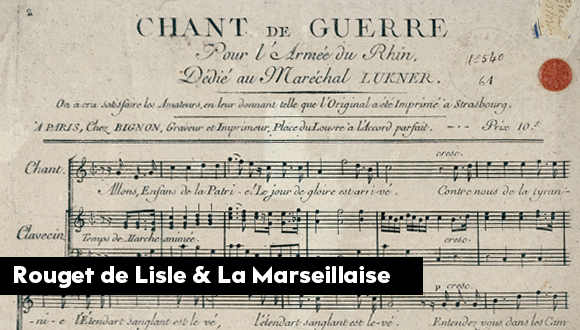War Song
French composer André Gréty (1741-1813) wrote to his friend Rouget de Lisle : “Your Marseillaise sounds like explosive cannon shots”. The War Song for the Army on the Rhine was a battle song that motivated the soldiers to continue the fight against the enemy. The music and lyrics greatly encouraged the soldiers to keep up the pace. Some lyrics speak about other peoples’ support for revolutionary ideas: the song written by Rouget de Lisle also refers to the call for all people to rise against the despotism of the old European monarchies in order to preserve and spread the freedom rights acquired during the Revolution.
From War Song to National Anthem
Following the proposal made by Joseph Servan (1741-1808), French Minister of War on 28 September 1792, La Marche des Marseillois (The March of the Marseillois) became the official song of the fighting Republic. On 24 November 1793, the Convention of “The Mountain” accepted it as national anthem by decree. Then, it fell from political grace but reappeared as a patriotic hymn or French national song on 17 July 1795. La Marseillaise was banned during the French First Empire, the Restauration and the Second Empire. However, it was shortly authorized after the July Revolution of 1830. During the Third Republic (1870-1940), Patrice de Mac Mahon (1808-1893), President of the French Republic, was antagonistic towards La Marseillaise. However, following his resignation, Léon Gambetta (1838-1882), President of the Chamber of Deputies, proposed on 14 February 1879, that the song be officialised. The deputies referred to the decree signed on 14 July 1795 to restore it as France’s national anthem. The Articles N°2 of the Constitution of 27 October 1946 of the Fourth Republic and the Constitution of 4 October 1958 of the Fifth Republic clearly state that “The national anthem shall be La Marseillaise”.
The Lyrics
In the original version of the chorus of La Marseillaise, the verb “Marchez, marchez” was conjugated in the second person plural imperative. But, subsequently and finally in the official version, it was conjugated in the first person plural : “Marchons, marchons” thus giving the song its musical energy which rhymes in French with “bataillons” and “sillons” (furrows). The lyrics of the songs underwent numerous changes. The first version written by Rouget de Lisle was divided up into six verses. Then, two other verses written anonymously were added. The seventh verse is known as “The children’s stanza”. The eighth verse was deleted by Joseph Servan when serving as Minister of War in 1792, on the ground of its religious nature. The full version of La Marseillaise contains fifteen verses whereas the current official version includes only seven.





Ajouter un commentaire